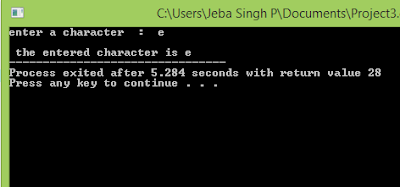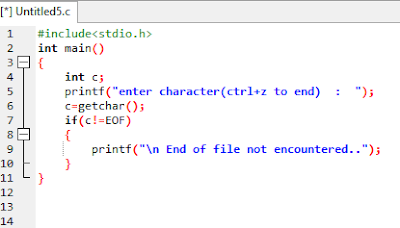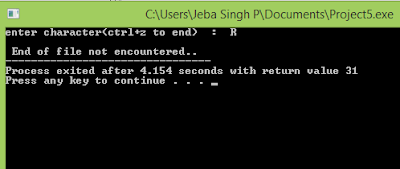The
GETCHAR() Function:
The getchar() is one of
the single character input / output functions.
Using the C library
function – getchar() , one is allowed to imput a single character from the
terminal . This function is the simplest input mechanism which reads character
at a time.
It returns a single
character that is typed in from the keyboard.
The function does not
require any argument though a pair of empty parenthesis must follow the word
getchar.
A reference to the
getchar function is written as
Character _variable = getchar();
Where
character_variable refers to some previously declared character variable.
See the below program
for better understanding
The output for the
above program is as follows
In the third line we
declared a character variable c,
In the fourth line we
are using printf() function which prints everything written within double
quotes. Lets discuss about printf() in our upcoming posts.
In the fifth line the
getchar function gets the user input and the value is stored in character
variable c.
In the sixth line we
are printing out what is character that the user entered to the console screen.
To distinguish the end
of the input from valid data , the getchar() function returns a distinctive
value when there is no more input , a
value that cannot be confused with any real character. This value is called EOF
, which denotes “End Of File”.
EOF is an integer
defined in the library file <stdio.h> .typically EOF will be assigned the
value -1 .(this value vary from compiler to compiler). The variable should be
declared to integer type for EOF .
Pressing the key CTRL +
Z cause EOT(End Of Terminal) to be sent to program.This character is
interpreted by getchar() as an end of file and getchar() then returns the
defined value of EOF.
Given below is an
sample program denote eof
Output :
Note : we will discuss
about if () statement in the upcoming posts.
Thank you….
Link to my home page :https://iamafutureprogrammer.blogspot.com/







![Java Code 3 _ Two - digit " Reduced Subtracted Form " [Wipro Interview Question]](https://blogger.googleusercontent.com/img/b/R29vZ2xl/AVvXsEjfknAUiMwSb6Ma-V3Usa9M-80j4etXJF3-Ns2u_azXAb33KPwfsvZtP17a2Tu1aLYKhCOmcG5ivzogedb8cXJzdE-Qd_q5VKx_VthmzjgrnnTYD0VYXoBSId6fvfoqTTXf2JRF_wij0Rw/w72-h72-p-k-no-nu/Screenshot+%252819%2529.png)



0 comments: